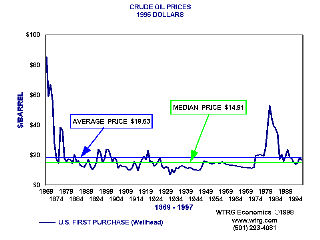
Weekday Commentary from Jim Puplava![]() Home
Home
|
The Long and Winding Road
The Perfect Financial Storm
|
|
||||||||||||||||||||||||||||||||||||||||||||||||||||||||
|
|
|
|
|
|
Market WrapUp for the Week
Monday l Tuesday l Wednesday l Thursday l Friday
Thursday's Stock Market WrapUp
HOW TO CREATE A CRISIS: OR GET READY FOR GAS LINES
One of the more memorable experiences of my college days was going to service stations at midnight in the hopes of filling my tank with gas. During daylight hours, gas stations were besieged by long gas lines as eager car owners waited to get their ration of gasoline. I had found a local station near my home got its refill of gas late at night. Since staying up late was a normal part of my life as a student, I would head to the filling station after midnight to get my tank refilled. It worked like magic. Not only did I get my tank filled, but I also avoided long lines in the process. Getting gas was critical. I needed to get to class and to work. Both of those objectives required dependable transportation, which meant keeping my car filled with gasoline.
These memories were brought back again as I view current events in the U.S. The Senate under Tom Daschle’s leadership has stopped drilling for new oil and natural gas in ANWR. Daschle’s efforts to block exploration and development of America’s oil and natural gas reserves reflects a growing movement by environmentalists that is leading the country closer towards its next energy crisis. What happened in California in 2000-2001 is a prelude of what is coming for the rest of the U.S. The environmental movement has been successful in its war to stop U.S. companies from exploring for and developing America’s natural resources. This has forced many companies to look overseas to replace declining oil and natural gas reserves. The U.S. has become more dependent on foreign sources of oil, natural gas, and oil related products, such as gasoline, and has increased our trade deficit with the rest of the world. We now import 60% of our oil and over 15% of our natural gas needs from foreign countries.
At the same time we are restricting the supply of energy, which is driving up its price, we are now considering implementing price controls at the gas pump to assuage frustrated consumers who are concerned over rising fuel costs, both at the pump and at home with their utility bills. Several states, beginning with Hawaii, are set to impose price controls at the pump, something that hasn’t been done since the nightmare days of the 1970’s oil embargo. Gasoline prices have risen lately because of a number of factors: OPEC cut production, the political unrest in the Middle East, and weak energy prices last fall, causing refineries to cutback output. Forgetting for the moment that the government has been restricting supply of energy by prohibiting new development, there are other government factors behind the rise in energy prices that go unmentioned by the press. One main factor is the strict environmental laws in certain states requiring special blends of gasoline. This serves to isolate that state’s fuel supplies. The gasoline price spikes in the Midwest in 2000 can be traced to new fuel requirements, which restricted supply. Several regions of the country such as Chicago, Milwaukee, and California experienced higher prices as a result of special fuel blends implemented by state governments. Look at any region of the country experiencing higher costs and chances are that it can be traced to special environmental restrictions legislated by the state.
Currently, the Hawaiian legislature is considering a bill that would establish gasoline prices set by state regulators. Regulators would once a week set the price for gasoline in the market. The average price for gasoline would be based on prices in Los Angeles, San Francisco and the Pacific Northwest. Absent from this calculation would be the added transportation costs of getting gas across the Pacific Ocean to Hawaii. The last time there were price controls in the U.S. was in 1973 when a Democratic led Congress passed price controls following the Arab oil embargo. Congress penalized oil companies for an event (the oil embargo) that was beyond the control of oil companies. The result was gas shortages and gas rationing. The price controls remained in effect until the Reagan Presidency. One of President Reagan’s first acts as President was to remove price controls in January of 1981. This freed up supply and created competition, which brought down prices from $40 a barrel to the low teens and twenties.
It is ironic given the failure of those policies that we would earnestly pursue them. The environmental movement has restricted the supplies of energy in this country that is driving the nation into further dependency on OPEC and other states that could exert enormous leverage over the U.S. economy. This is not only reckless from a national security point of view, but it is also economic suicide. It is bad enough that environmental extremists have been successful in shutting down exploration and development of America’s energy resources; now these organizations, through their lobbying efforts at the state and national level, are moving to impose price controls. There is no better way to harm consumers than through price controls. Restricting supply and then limiting price is going to prevent companies from making money. Deprived of profits, companies will cut back on production, which will limit supply. The result will be shortages, much higher prices, and long lines again at gas stations across the country. The government has once again created an energy crisis that will do irreparable harm to the nation’s security, economy and to consumers. The only problem this time is that America is much more dependent for its energy needs. We now import over 60% of our oil compared to the last crisis when we imported only 25% of our energy needs.
Years of environmental activism has come home to roost. Even more disconcerting is that my own state, which created its own energy crisis, has not learned a lesson from the last crisis. California is now implementing a new fuel standard that is going to drive California gas prices through the roof. The governor of the state is considering delaying implementing the new fuel until after his November election. While the state continues to create legal hurdles for the building of new gas pipelines, we continue to add to gas powered power plants. Add the fact that the state is considering new gas taxes and price controls, and it is not hard to see where this is leading us.
At the same time that supply is being restricted, Congress holds hearings on energy in an effort to badger the industry about why prices are rising. It is as if they are totally oblivious to what is going around them in the Middle East or at OPEC headquarters. As the crisis the government has created gets worse, those who are responsible for creating the crisis look for scapegoats. We are now introduced to the familiar industry bashing that occurs whenever prices rise. Neglected in the hearings are the reasons for the crisis, which are government mandated regulations, supply restrictions, and new energy taxes. As prices begin to rise ever further this summer, and if shortages start appearing as a result of price controls, look for the demagoguery by those who created the crisis to get even louder.
What is going on with the energy markets is just the tip of the iceberg. The same restrictions are taking place in mining, forestry, ranching, farming and in our fishing industry. A New England District Judge, Gladys Kessler, just dealt a severe blow to a Gloucester fishing fleet. The judge cut the amount of fishing days and closed more fishing grounds available to the fishing fleet. Fishermen must go out to deeper, more dangerous waters to find fish, while the number of days allowed for fishing is reduced. The days the fleet is allowed to go fishing has been reduced from 88 days to 70. The new rules imposed by the district judge also closed off coastal areas in the Gulf of Maine that extends to Canada. This is shutting out small boats that can’t reach open fishing grounds farther out to sea.
What I just described here is happening to the farming, ranching, mining, energy, and forestry industry, driving up costs and unemployment. This is one more reason I’ve become so bullish on raw materials as I have written in "The Next Big Thing." Government actions are creating an energy and raw material crisis that is going to drive raw material prices through the roof. The fact that the world’s largest economy and consumer of raw materials has allowed itself to go from complete self sufficiency only strengthens my belief that large profits are going to be made in this area. Only after prices go through the ceiling, when the nation experiences shortages, blackouts, and death due to lack of energy, will the public be ready for a change. When that happens, we will be hiring bounty hunters to root out and find the extremist that led us into this crisis. As I mentioned in yesterday’s wrap-up, history has a way of repeating itself. It has been three long decades since the last energy crisis, and in terms of recorded history, that was only a short time ago. You would think the lessons of the disastrous policies of the 1970’s would be well remembered. Instead, they have been forgotten and are now being repeated.
Markets were mixed on Thursday with the Dow Industrials, Utilities and Transports managing minor gains, while the S&P 500 and Nasdaq continue to fall. Concerns are mounting with investors and analysts that the recovery may be slipping away and corporate profits will continue to disappoint. The Nasdaq fell to its lowest level in more than six months. The index is down over 15% percent this year having lost 67% of its value since reaching a peak back in March of 2000. Driving down the Nasdaq was news coming from Dell Computer and Micron Technology this week that they expect stagnant demand for their products. Analysts are now preparing for reduced expectations for remainder of the year. New orders for non-defense capital goods fell 3.6% in March after rising the previous month. Analysts are now realizing profits aren’t going to come bouncing back like they originally estimated.
Volume declined with only 35 billion shares traded on the NYSE and 2.03 billion on the Nasdaq. Market breadth was positive on the big board by 18 to 13 and was negative on the Nasdaq by 18 to 17. Investors were still investing defensively by buying only the blue-chips.
Overseas Market
European stocks fell as phone companies tumbled on concern about profit at their traditional telecommunications businesses. France Telecom plunged to a record, and Deutsche Telekom slumped to its lowest this year. The Dow Jones Stoxx 50 Index lost 13.11, or 0.4% to 3496.89.
Japan's Nikkei 225 stock average fell, led by automakers such as Honda Motor Co. after the yen's climb to an eight-week high against the U.S. dollar crimped the value of their overseas revenue. The Nikkei dropped 0.1% to 11,543.21, while the Topix index added 0.03% to 1087.21.
Treasury Market
Government bonds gave back all of yesterday's gains and then some with losses in the long end of the yield curve. The 10-year Treasury note shaved 11/32 to yield 5.10% while the 30-year government bond fumbled 12/32 to yield 5.595%.
© Copyright, Jim Puplava, May 2, 2002


 For more on Oil see
For more on Oil see 